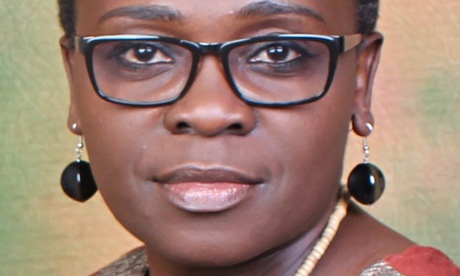
Uganda is no longer a "literary desert", according to the author Jennifer Nansubuga Makumbi, speaking after winning the Commonwealth short story prize for a piece praised by judges for its "risk-taking, grace and breadth".
The Ugandan writer beat contenders from around the world to win the £5,000 award for Let's Tell This Story Properly, in which a Ugandan woman, Nnam, living in Manchester, finds her husband has "died in the bathroom with his pants down. He was 45 years old and should have pulled up his pants before he collapsed. The more shame because it was Easter. Who dies naked on Easter?" She travels back to Uganda for his funeral, to discover a web of deception.
The prize, intended to discover new voices from the countries of the Commonwealth, drew nearly 4,000 previously unpublished entries. Chair of the judging panel Ellah Wakatama Allfrey said Makumbi's entry, with its "bereaved widow living in London and gaggle of feisty 'women of a certain age' disrupting a funeral, and its narrative style that draws on a powerful national heritage of dramatic story-telling, significantly expanded our understanding of the possibilities of the short story form".
Makumbi, who teaches creative writing at Lancaster University and is currently working on her second novel, Nnambi, said she was "over the moon" to win the Commonwealth award, which was presented in Kampala by the novelist and short-story writer Romesh Gunesekera.
"It was the usual reaction – first you cry, then you jump, then you cry again, then dance, and then you don't really know how to react," she said. "This is a dream. For Uganda, once described as a literary desert, it shows how the country's literary landscape is changing and I am proud to be a part of it."
Makumbi was referring to the poet Taban lo Liyong's claim in the 1960s that east Africa was a literary desert. "It was an unfortunate thing to say," said Makumbi. "It presumes literature is in English, and is the novel, whereas Uganda has had a thriving drama scene in [local] languages, which is what has kept it going when writers have gone into exile."
She pointed to authors writing in English today including Doreen Baingana, and Jackee Batanda. "There is promise in the desert today in terms of fiction, and writing in English," said Makumbi, expressing the hope that her win would "help bring attention to Ugandan writing at a global level".
Her prize-winning story, she said, is one of immigration. "There are all these immigration experiences where people have got to get married, under very different circumstances than they would have done back home, and the insecurities that come without knowing the reality, the truth," she said. "It's one of those stories you pluck out of the air."
Makumbi was born in Uganda, and moved to the UK in 2001 to study at Manchester Metropolitan University. She now has a PhD in creative writing from Lancaster University, and her doctoral novel, The Kintu Saga, won the Kwani? Manuscript Project in 2013. The novel is due to be published this summer as Kintu.

